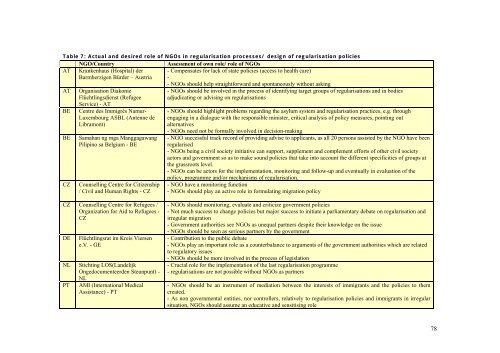REGINE Regularisations in Europe Final Report - European ...
REGINE Regularisations in Europe Final Report - European ...
REGINE Regularisations in Europe Final Report - European ...
You also want an ePaper? Increase the reach of your titles
YUMPU automatically turns print PDFs into web optimized ePapers that Google loves.
Table 7: Actual and desired role of NGOs <strong>in</strong> regularisation processes/ design of regularisation policies<br />
NGO/Country<br />
Assessment of own role/ role of NGOs<br />
AT Krankenhaus (Hospital) der<br />
Barmherzigen Bürder – Austria<br />
- Compensates for lack of state policies (access to health care)<br />
-<br />
AT<br />
BE<br />
BE<br />
CZ<br />
Organisation Diakonie<br />
Flüchtl<strong>in</strong>gsdienst (Refugee<br />
Service) - AT<br />
Centre des Immigrés Namur-<br />
Luxembourg ASBL (Antenne de<br />
Libramont)<br />
Samahan ng mga Manggagawang<br />
Pilip<strong>in</strong>o sa Belgium - BE<br />
Counsell<strong>in</strong>g Centre for Citizenship<br />
/ Civil and Human Rights - CZ<br />
- NGOs should help straightforward and spontaneously without ask<strong>in</strong>g<br />
- NGOs should be <strong>in</strong>volved <strong>in</strong> the process of identify<strong>in</strong>g target groups of regularisations and <strong>in</strong> bodies<br />
adjudicat<strong>in</strong>g or advis<strong>in</strong>g on regularisations<br />
- NGOs should highlight problems regard<strong>in</strong>g the asylum system and regularisation practices, e.g. through<br />
engag<strong>in</strong>g <strong>in</strong> a dialogue with the responsible m<strong>in</strong>ister, critical analysis of policy measures, po<strong>in</strong>t<strong>in</strong>g out<br />
alternatives<br />
- NGOs need not be formally <strong>in</strong>volved <strong>in</strong> decision-mak<strong>in</strong>g<br />
- NGO successful track record of provid<strong>in</strong>g advise to applicants, as all 20 persons assisted by the NGO have been<br />
regularised<br />
- NGOs be<strong>in</strong>g a civil society <strong>in</strong>itiative can support, supplement and complement efforts of other civil society<br />
actors and government so as to make sound policies that take <strong>in</strong>to account the different specificities of groups at<br />
the grassroots level.<br />
- NGOs can be actors for the implementation, monitor<strong>in</strong>g and follow-up and eventually <strong>in</strong> evaluation of the<br />
policy, programme and/or mechanisms of regularisation.<br />
- NGO have a monitor<strong>in</strong>g function<br />
- NGOs should play an active role <strong>in</strong> formulat<strong>in</strong>g migration policy<br />
CZ Counsell<strong>in</strong>g Centre for Refugees /<br />
Organization for Aid to Refugees -<br />
CZ<br />
DE<br />
NL<br />
PT<br />
Flüchtl<strong>in</strong>gsrat im Kreis Viersen<br />
e.V. - GE<br />
Sticht<strong>in</strong>g LOS(Landelijk<br />
Ongedocumenteerden Steunpunt) -<br />
NL<br />
AMI (International Medical<br />
Assistance) - PT<br />
- NGOs should monitor<strong>in</strong>g, evaluate and criticize government policies<br />
- Not much success to change policies but major success to <strong>in</strong>itiate a parliamentary debate on regularisation and<br />
irregular migration<br />
- Government authorities see NGOs as unequal partners despite their knowledge on the issue<br />
- NGOs should be seen as serious partners by the government<br />
- Contribution to the public debate<br />
- NGOs play an important role as a counterbalance to arguments of the government authorities which are related<br />
to regulatory issues<br />
- NGOs should be more <strong>in</strong>volved <strong>in</strong> the process of legislation<br />
- Crucial role for the implementation of the last regularisation programme<br />
- regularisations are not possible without NGOs as partners<br />
- NGOs should be an <strong>in</strong>strument of mediation between the <strong>in</strong>terests of immigrants and the policies to them<br />
created.<br />
- As non governmental entities, nor controllers, relatively to regularisation policies and immigrants <strong>in</strong> irregular<br />
situation, NGOs should assume an educative and sensitis<strong>in</strong>g role<br />
78
















